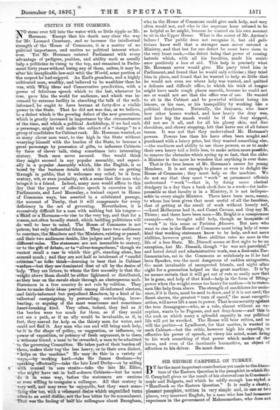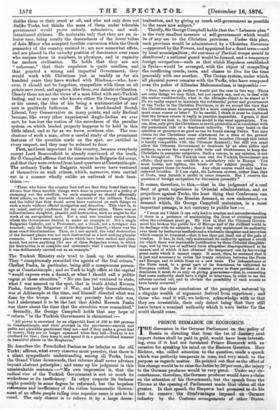SIR GEORGE CAMPBELL ON TURKEY.
BY far the most important contribution yet made to the litera- ture of the Eastern Question is the pamphlet in whinlirSir G. Campbell gives us the result of his observations in Constanti- nople and Bulgaria, and which he oddly enough has styled . a "Handbook on the Eastern Question." It is really a chatty, pleasant pamphlet, written in very simple and, in one.ar two places, very incorrect English, by a man who has had immense experience in the government of Mahommedans, who does not dislike them or their creed at all, and who not only does not dislike Turks, but thinks the mass of them under tolerable government would prove orderly, submissive, and well- intentioned citizens. He maintains only that they are an in- ferior race, being mostly the descendants of the lower tribes of Asia Minor who accepted forcible conversion when the Greek peasantry of the country resisted it ; are now somewhat effete, and are placed in the unlucky position of dominance over races who surpass them in numbers, in physique, and in capacity for modern civilisation. He holds that they are not " unhuman," that their expulsion is quite needless, and that granted a strong and impartial Government, they would work with Christians just as readily as for six hundred years they have worked with Hindoos,—who, how- ever, it should not be forgotten, sympathise with them on all points save creed, and approve, like them, our Asiatic civilisation. Clearly these are not the views of a man filled with anti-Turkish feeling, and to any one who knows either Sir George Campbell or his career, the idea of his being a sentimentalist of any sort is positively ludicrous. He is a hard-headed Scotch Liberal, very Conservative on many points, and only Radical because, like every other experienced Anglo-Indian we ever met, he has lost the notion of the sacredness of the peculiar system on which landed property happens to be held in this little island, and so far as we know, nowhere else. The con- clusions of such a man, after a careful study of the prominent features of the question made on the spot, are entitled to every respect, and they may be reduced to four. First, and least important in this country, because everybody except Lord Beaconsfield is already convinced of the truth, Sir G. Campbell affirms that the massacres in Bulgaria did occur, and that they were ordered from head-quarters at Constantinople. The ordinary Turks in Bulgaria would never have ventured of themselves on such crimes, which, moreover, were carried out in a manner wholly unlike an outbreak of mob fana- ticism :— "Those who know the country best tell me that they found their con- fidence that those terrible things wore done in pursuance of a policy of stamping out the rebellion, by such examples as should effectually deter others, on the really tractable character of the ordinary Turks, and the belief that they would never have ventured on such things on such a scale without official instigation and direction. This view is, to my mind, entirely confirmed by my own observation. There was no indiscriminate slaughter, plunder, and destruction, such as might be the work of an unregulated mob. Not a soul was touched except those whom the Government desired to make an example of. Not a single Bulgarian Catholic, not a Protestant, not a Greek, not a foreigner was touched ; only the Bulgarians of the Bulgarian Church,—there was the most exact discrimination. Then, as I saw myself, the total destruction of the doomed places was not such destruction as a mob seeking plunder commits. I have seen many places which have been sacked and plun- dered, but never anything like one of these Bulgarian towns, in which the destruction is so complete and systematic that I cannot doubt that it was deliberately carried out as an example."
The Turkish Ministry only tried to hush up the atrocities. They "conspicuously rewarded the agents of the foul crimes," Chefket Pasha, in particular, being still a conspicuous person- age at Constantinople ; and no Turk in high office at the capital "would express even a decent, or what I should call a politic regret at these atrocities." "No one has yet ventured to state, what I was assured on the spot, that in truth Abdul Kereem Pasha, formerly Minister of War, and lately Generalissimo, was at Adrianople at the time, and himself directed what was done by the troops. I cannot say precisely how this was, but I understand it to be the fact that Abdul Kereem Pasha was there about the time that the atrocities were committed."
Secondly, Sir George Campbell holds that any hope of '" reform " in the Turkish Government is chimerical:—
" All power is exercised by an oligarchic knot of 100 to 200 persons in Constantinople, and their proteges in the provinces—smooth and polite and plausible gentlemen they are—and if they make a groat deal of money, they are no longer squeezed when they fall—Turkey is too civilised for that ; they keep it, and spend it in a quasi-civilised manner in beautiful places on the Bosphorus."
He describes the Prenchified Pashas as far inferior so the old Turks; affirms, what every observer must perceive, that there is a silent, sympathetic understanding among all Turks, from the Grand Vizier downwards, that reforms shall never advance beyond abstract principles ; and sums up his judgment in this unmistakable sentence :-••-" My own impression is, that the radical vice of the Turkish Government is not so much its wickedness as its inefficiency: In other respects its badness might possibly in some degree be reformed, but the hopeless robtenness and inefficiency of the rotten bureaucratic Govern- ment of an effete people ruling over superior races is not to be cured. The only chance is to relieve it by a large decen- tralisation, and by giving as much self-government as possible to the races now subject."
Thirdly, Sir George Campbell holds that the "Lebanon plan" is the very smallest measure of self-government which would be of any use to the Christian provinces. Under this plan, each province would be administered by a Christian Governor —approved by the -Powers, and appointed for a fixed term—and by local municipalities ; the entrance of Turkish troops would be disallowed; a national guard would be formed, and a temporary foreign occupation—such as that which Napoleon established in Syria—would be arranged, with the object of compelling the conflicting creeds, races, and classes to live for the time peaceably with one another. The Cretan system, under which all physical power remains with the Turks, who have composed even the police of Albanian Mahom.medans, is impossible :— " Now, before we go farther I would put the case in this way. There are some things we may think, but not openly say, and so, to deal with the matter confidentially, what is the ultimate object to be aimed at ? Do we really expect to maintain the substantial power and government of the Turks in the Christian Provinces, or do we accept the view that the Christians must be prepared for a more complete autonomy, which must come sooner or later? To be candid, I think it must be confessed that the former course is really in practice impossible. I grant, if that were what we look to, the Cretan model is the most appropriate. You can, then, only give the Christians so much protection as is consistent with the permanent rule of a dominant minority. You may insist on the selection of governors as good as can be found among Turks. You may obtain for the Christians some abatement for a time of the grosser forms of oppression, and some relief from taxation (though this latter is hardly compatible with the Ottoman finances); but still you must allow the Ottoman Government to dominate by an alien police and soldiery, to cover the country with forts and blockhouses, to keep the Christians in complete subjection. Such a course, in my opinion, is not to be thought'of. The Turkish race and the Turkish Government are effete ' • they never can establish a satisfactory rule in Europe. You must loosen, not tighten, the bonds of the subject peoples. You must prepare them for freedom. Any other course would only lead to renewed troubles. If I am right, the Lebanon system, rather than that of Crete, may furnish a model in some respects. But I reserve the question of foreign occupation for discussion presently."
It comes, therefore, to this,—that in the judgment of a cool Scot of great experience in Oriental administration, and no prejudices against Turks, the least thing that Conference can grant is precisely the Russian demand, as now understood,—a demand which, Sir George Campbell maintains, in a most important passage, is not contrary to public law :— "I must say I think it can only lead to evasion and misunderstanding if there is a pretence of maintaining the form of existing treaties when the substance must go. My view is, that the Ottoman Govern- ment has broken the public law of Europe and of the civilised world in its dealings with its subjects; • that it has only maintained its authority over them by barbarous methods and a wholesale slaughter and terrorism which cannot be tolerated—that it has thus put itself out of the pale of treaties. It has, in fact, only maintained its authority against a revolt for which there was reasonable justification by these Oriental slaughter- ings, and by the use of military force altogether disproportioned to its means, and of which it has obtained the temporary use by borrowing great sums which it cannot repay. It must, then, be assumed that it is just and necessary to revise the treaty relations between the Porte and Europe, and to settle them on a new basis. The independence of the Porte must, in a great part of its dominions, be subjected to European control. So far as it retains power in these portions of its dominions it must do so only on giving guarantees—that is, consenting that some authority shall have a right to intervene, in order to see the reforms carried out, and to obviate the possibility of such events as have lately occurred."
Those are the clear conclusions of the pamphlet, enforced by a singular wealth of argument derived from experience ; and those who read it will, we believe, acknowledge with us that they are irresistible, their only defect being that they still leave intact a nominal authority which it were better for the world should cease.



































 Previous page
Previous page